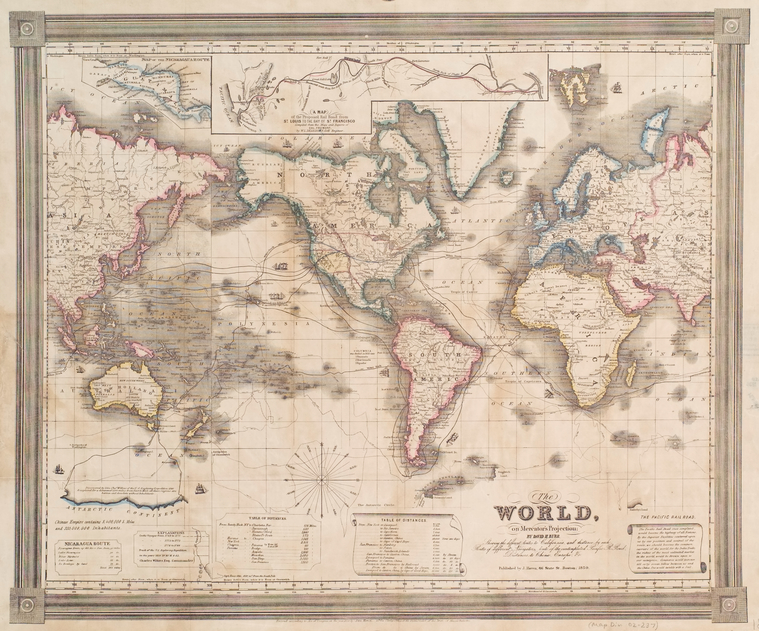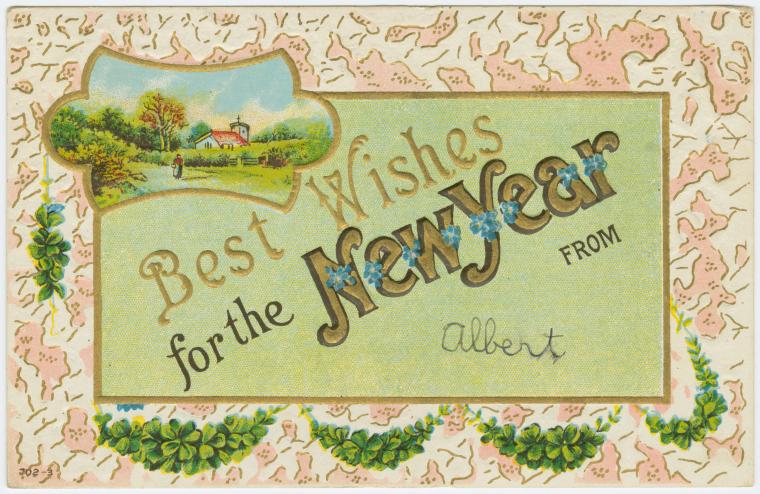Lifelong Learning
New Year's Resolution for 2012: Learn a New Language!
As 2011 slowly comes to an end, many of us are anxiously waiting for 2012 to arrive! Usually around this time — for some of the ambitious ones — we make New Year's resolutions. Can we actually keep them through the end of the year? Maybe. It depends on your resolutions and the goals you create to achieve them. Some have many resolutions for the year, such as creating and maintaining a new exercise routine, like yoga; learning to play a musical instrument, like the piano; planning a stress-free wedding; seeking employment or better career opportunities; becoming more active in a particular faith; or developing a stronger spiritual connection. Whatever your resolutions, NYPL commends you for recognizing your desire to advance your knowledge and become a lifelong learner.
For this upcoming year, I encourage everyone to learn a new language. (Learning a new language has ranked high in past New Year's resolution lists.) Whether you learned a language in grade school or college; spoke another language at home with your family; or are simply enamored at the sound and beauty of a foreign language — now is the time to either continue where you left off or make a fresh start. Nothing is more impressive and intimate than speaking a foreign language with precision and passion.
Why learn a new language? First, you must ask yourself why you want to learn a particular language — perhaps its a personal interest or a business need — otherwise it will be very easy to quit your resolution. Learning and speaking another language is difficult, but not impossible. Second, you must create goals. Learning a language takes time and, more importantly, patience. A single year will not guarantee fluency, but it will provide a stepping stone for you to thrive linguistically and culturally for years to come. More importantly, think of it is not so much as a destination, but as a journey or hobby that brings pleasure to your. Here are more compelling reasons to learn a new language:
- Knowing a second language can improve your job prospects! Whether you are interested in working for the United Nations or simply seeking business opportunities in Spain, knowledge of a foreign language can lead to more professional opportunities.
- Today we live in the era of globalization, where U.S. companies are constantly in competition with foreign counterparts. However, not everyone speaks English. If you have the traveling bug, learning another language can expand your horizons in understanding another culture while you travel and connect with the locals.
- Learning a language has enormous health benefits for your brain. Scientific studies have concluded that language acquisition may dramatically decrease mental illnesses, such as dementia or Alzheimer’s disease.
- Knowledge of one language can help you learn a more complex language. It will also improve your native language, because it makes you think about translation and how English grammar works.
- If you feel a calling to connect with a religion, like Judaism or Islam, you can learn Hebrew to read the Torah or Arabic to read the Quran. Languages can serve as bridges to learning faiths and history.
- If you are also planning to return to school for a graduate degree, knowing another language can make you stand out as a candidate in the business, medical, or legal fields; and it is important to know another language for research purposes.
We are not all perfect, and we all learn in different ways. Some are comfortable learning independently, while others are motivated to learn in a classroom setting. The first step may be hard and strange as you become familiar with the cultures of the script, rules, and grammar, but don’t worry — every language student can tell you, “a mile to fluency begins with a single step.”
Overall, learning a language is applicable in every day life — it is the ultimate gateway to the cultures of the speakers in their respective countries or communities.
Here are the top five most spoken languages in the world:
- Chinese (Mandarin) — the official language (and dialect) in the People's Republic of China, with over a billion speakers in the country and throughout the world. The Foreign Service Institute of the U.S. Department of State ranks Chinese Mandarin as a category III language — (along with Arabic and Japanese) one of the most difficult languages to learn. However, there are more speakers of this language, which may influence and inspire you to take on this challenge.
- English — From Australia to Hong Kong, this language is spoken by over 500 million people. "The language is widely used among the international political, business, academic, and scientific communities."
- Spanish — With over 400 million speakers across the world, particularly in Europe and the Americas, the Spanish language is one of the most popular Romance languages to learn, due to its simplicity and beauty.
- Hindustani (Hindi) — Ranked as a category II language by the Foreign Service Institute, Hindustani is spoken by over 400 million people (slightly under Spanish) in India and abroad. Bollywood, one of the largest film producers in the world, often produces films in Hindi and English. This is a great way to immerse yourself in the language.
- Russian — There are over 200 million speakers of this language in Russia, Eastern Europe, and abroad. It is also one of the six official languages of the United Nations (the others are Chinese Mandarin, English, Spanish, French, and Arabic). Russian is also one of the hardest languages to learn.

To get you started, consider using the free database Mango Languages, available through NYPL. Packed with over 20 different languages, ranging from Korean to Dari and more, Mango Languages is a great language tool to kick start your learning. From easy to advanced, you can learn any of these languages in your local library or in the convenience of your own home with a library card.
You can even learn the language “pirate.” If you're a fan of the Pirates of the Caribbean series, you may be familiar with the lingo of Captain Jack Sparrow, but you may not realize that there is syntax and grammar used and applied by these maritime rebels.
Learn how to use Mango Languages at the Library >>
Search the NYPL catalog for:
- Pimsleur audio
- The "Teach Yourself" series
- Collins Easy Learning
- Berlitz books and audio
- The McGraw-Hill "Demystified" series
- eBooks and e-audiobooks available for download
- More information about other language programs/databases at NYPL
But why stop there? Consider joining a language group at Mid-Manhattan Library or at other NYPL neighborhood libraries. Meet other speakers or language enthusiasts from time to time and get connected! Improve or show off your language skills! You can also join English language classes to improve other people’s English skills, and they in turn may be able to share their native languages with you. This is a great way to make friends and strengthen your skills.

If you are not a beginner and are interested in learning to read in a particular language, consider PressDisplay, an international newspaper database that connects to over 1,000 newspapers from all over the world. Read current daily newspapers in Turkish or Hungarian in any NYPL library or at home. This is an excellent way to catch up on the news, improve your reading skills, enhance your knowledge of foreign affairs, and most importantly, enrich yourself! Learn more about PressDisplay >>
May 2012 become the year to learn another language! Even if you don’t succeed in becoming fluent in Egyptian Hieroglyphics, French or American Sign Language, you can at least try, and more importantly, have fun with it!
Learn more about getting a NYPL library card >>
Another great way to learn a language is through books and foreign films. NYPL has an extensive collection of world languages, literatures, and cinemas. Find out more >>
As the year comes to an end, NYPL is dependent upon your support for its foreign language books, free language programs at Mid-Manhattan Library, and access to online databases. Why not start 2012 by giving a gift to all New Yorkers — an opportunity to grow and learn — and help the Library maintain and support its rich collections for language enthusiasts like yourself?
Read E-Books with SimplyE
 With your library card, it's easier than ever to choose from more than 300,000 e-books on SimplyE, The New York Public Library's free e-reader app. Gain access to digital resources for all ages, including e-books, audiobooks, databases, and more.
With your library card, it's easier than ever to choose from more than 300,000 e-books on SimplyE, The New York Public Library's free e-reader app. Gain access to digital resources for all ages, including e-books, audiobooks, databases, and more.
If you don’t have an NYPL library card, New York State residents can apply for a digital card online or through SimplyE (available on the App Store or Google Play).
Need more help? Read our guide to using SimplyE.
![[Isiac tablet.],Mensae Isiacae., Digital ID 1526798, New York Public Library [Isiac tablet.],Mensae Isiacae., Digital ID 1526798, New York Public Library](https://images.nypl.org/?id=1526798&t=w)





Comments
well, there's no excuse now,
Submitted by Anonymous (not verified) on December 31, 2011 - 4:39pm
New Year's Resolutions...
Submitted by Anonymous (not verified) on February 9, 2012 - 3:27pm
There is no time like the present (to learn a new language)
Submitted by GreenSea (not verified) on November 11, 2017 - 1:00pm